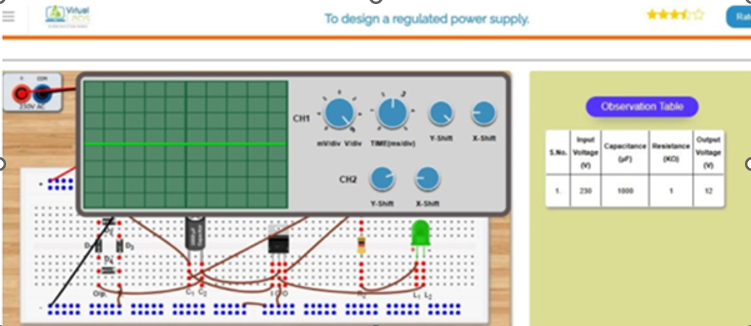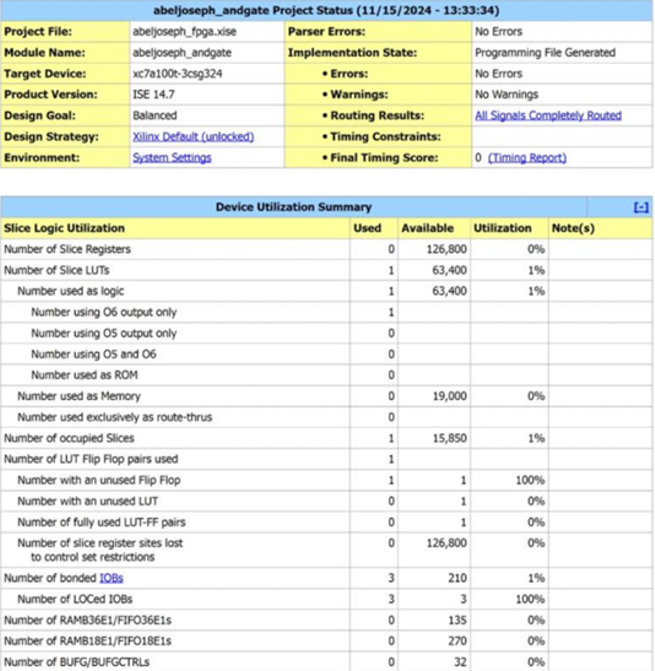1)Innovative Teaching in Analog Circuits Lab(20ECT202) – virtual lab
Subject: 20ECT202 – Analog Circuits
Faculty: Er. Abraham K. Thomas
Concept: Voltage Regulator ICs
Tool Used: https://vlab.amrita.edu/
Students utilized a virtual lab to implement a regulated power supply, enhancing their understanding of voltage regulator ICs. This hands-on simulation helped them familiarize themselves with breadboard wiring and observe the stable DC output provided by the IC 7812.
Goal
1. Strengthen conceptual understanding of voltage regulation.
2. Provide a practical learning experience without physical hardware.
3. Enhance circuit implementation skills through simulation.
Proof
1. Students successfully wired and simulated a regulated power supply circuit.
2. Observed the role of IC 7812 in maintaining a steady 12V DC output.
3. Improved their troubleshooting and circuit analysis skills.

Outcome
1. Gained confidence in implementing voltage regulator circuits.
2. Developed a deeper understanding of power supply design.
3. Enhanced their ability to correlate theoretical knowledge with practical applications.
2)Innovative Teaching in Design Thinking – Flipped Classroom
Subject: Design Thinking
Faculty: Er. Anish M. George
Students applied the Design Thinking approach to design a college bag, focusing on user needs and budget constraints. The session highlighted key stages such as empathizing, ideating, prototyping,
and iterating solutions.
Activity Question
Illustrate the Design Thinking process for designing a budget-friendly college bag, describing each stage and using hand sketches for support.
Goal
1. Develop problem-solving skills by applying Design Thinking principles.
2. Encourage creativity and innovation in product design.
3. Enhance practical understanding through hands-on ideation and prototyping.
4. Improve collaborative learning by engaging in group discussions and iterative refinement.
Proof
1. Students successfully identified user needs by analyzing college students preferences.
2. Applied the five stages of Design Thinking to develop functional bag concepts.
3. Engaged in interactive discussions, refining ideas based on feasibility and cost.
4. Demonstrated understanding through sketching and conceptual prototyping.
Outcome
1. Students designed realistic and innovative college bag concepts.
2. Developed hand-drawn prototypes with thoughtful features and constraints in mind.
3. Gained hands-on experience in iterative design and user-centered thinking.
4. Improved their ability to visually and verbally communicate design solutions
3)Innovative Teaching in FPGA-Based System Design
Course – Project-Based & Problem-Based Learning
As part of the FPGA-Based System Design course, Dr. Ajith Ravindran integrated Project-Based and Problem-Based Learning (PBL) to enhance students practical understanding of FPGA architectures and digital logic implementation.
Students successfully implemented logic circuits on the Nexys 3 FPGA board, gaining hands-on experience with hardware design and validation. The Xilinx project report serves as documented proof of the work carried out, showcasing their ability to design, simulate, and deploy digital systems on FPGA hardware.
This approach enabled students to bridge the gap between theoretical concepts and real-world applications, preparing them for advanced work in FPGA and digital system design.

4)Innovative Teaching – Research-Driven Learning
Research-driven learning plays a vital role in fostering innovation, critical thinking, and technical expertise among students. Faculty members actively guide and mentor research projects that contribute to advancements in engineering and technology. Recent research studies presented at prestigious IEEE conferences highlight the institutions commitment to academic excellence and industry relevance.
Research Contributions:
- Efficiency and Speed Trade-Offs in 8-Bit CMOS Adders at 180nm: An In-Depth Examination
Faculty Mentor: Dr. Ajith Ravindran
Student: Sarath Kumar
Conference: 2023 IEEE International Conference on Recent Advances in Systems Science
and Engineering (RASSE)
Overview: This study explores the trade-offs between efficiency and speed in 8-bit
CMOS adders fabricated at 180nm technology. The research provides insights into
optimization techniques for low-power and high-speed arithmetic circuits, contributing
to advancements in semiconductor design and digital circuit optimization. - A Systematic Review of Noise Types, Denoising Methods, and Evaluation Metrics in Images
Faculty Mentor: Er. Preena Prasad
Student: Divapriya Anil
Conference: 2023 IEEE International Conference on Recent Advances in Systems Science
and Engineering (RASSE)
Overview: This paper presents a comprehensive review of noise types in images, various
denoising techniques, and evaluation metrics used to assess image quality. The study
systematically analyzes recent advancements in image processing and noise reduction
methodologies, contributing to the development of more effective image enhancement
techniques.












